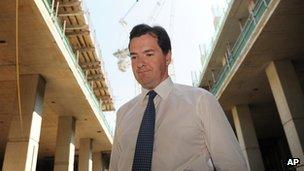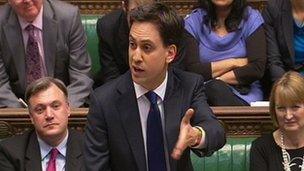A postcard to the Westminster village
- Published
- comments
Dear all,
Been away from SW1 for a few days. Missed so much - Britain getting even deeper into recession (unless, that is, the figures turn out to be wrong), George being replaced as chancellor by Vince (unless, that is, he replaces Nick as leader), Ed teaming up with Francois in Paris (unless, that is, it's on tax, since they disagree about the top rate and the financial transaction tax).
After a week watching, listening and thinking but not reporting, everything looks a little bit clearer than it did. I am struck that, once again, conventional wisdom (CW) is as wrong as it so often is.
CW now has it that Cameron is pondering whether to sack his chancellor who is "under more pressure than ever before", the Coalition is falling apart and Ed Miliband should be measuring the curtains as he prepares to move into Number 10.
The reality is that the prime minister is as likely to appoint David Beckham as chancellor as some of the candidates I've heard suggested.

George Osborne doesn't know what pressure is...
As for the pressure George Osborne is said to be under, it would have seemed nothing to former residents of Number 11.
Callaghan battled in vain to stop devaluation; Healey tried to take on the unions and ended up making a humiliating journey to the IMF; Howe's policies produced, at first, soaring inflation, interest rates and unemployment and a call to change course by 365 economists; Lawson became locked in a battle with Margaret Thatcher over the fundamentals of economic policy; Lamont presided over the ejection of the pound from the ERM, interest rates of 15% and the defeat in the Commons of his Budget tax plans whilst Darling faced the credit crunch, bank collapses, the 10p tax debacle etc...
Crucially and surprisingly, there is no split in the Coalition on its economic strategy. Vince Cable has not called in private or in public for a new approach although if he were chancellor he would be bolder with investment plans and with the banks who are still failing to deliver credit.
Finally, I struggle to detect much momentum for an alternative economic strategy.
Yes, the IMF says the government should consider changing course but the organisation's head backs the chancellor.
Yes, the deputy head of the OECD says it's time for a new approach but his boss does a better job of advocating Coalition policy than any minister has.
Yes, business groups are growing increasingly impatient of ministerial promises of easier credit, greater investment and a new airport tomorrow but never today. Yes, the Tory right lobby for a return to the reassuring certainties of the Thatcher era - tax cuts, deregulation and new laws to restrict the unions - but there is no powerful faction in the Cabinet or on the right which looks capable of forcing a change in approach.

Ed Miliband was said to be finished - not any more
Yet, despite all this, this is a moment of real political danger for the government. Something real has changed since the last long Westminster break in the run up to Christmas.
Do you remember what CW was saying then? Ed Miliband was said to be finished and unelectable and the subject of muttering, if not, plots in the Labour Party. Not any more.
It's not just that the Labour leader has successfully exploited the government's difficulties, grown in confidence and silenced the doubters. It is, quite simply, that the economy has not performed as the government predicted it would. It is the numbers, stupid - falling GDP and rising borrowing - combined with a loss of ministerial competence - all those U-turns - which have spooked the electorate.
The Coalition has now lost the benefit of the doubt on its central purpose. Voters are remembering that Gordon Brown, never mind the two Eds, warned that cutting too far and too fast might kill recovery.
Labour has re-gained the opportunity of a hearing when it spells out what it would do differently. At the same time there is the danger that any slip will be pounced on as evidence that the party is not ready to govern again.
The Conservatives and the Liberal Democrats could lose it if they look more interested in talking to themselves than talking to the country about what they're going to do.
Starting this Autumn Ed Miliband must decide whether the country simply wants reassurance that Labour can be trusted again or whether the electorate is ready to embrace real change.
The Conservatives must choose between simply seeking to regain their reputation for competence or building a prospectus - on Europe, immigration and human rights - for what they would do if allowed to govern alone.
The Lib Dems must decide whether they can differentiate themselves from the Tories whilst still making a success of the coalition.
It is all to play for. Once the summer's Games are over, the political games will begin.
PS
I am taking a summer break from regular blogging but will be back in September. Tweets will continue from time to time but the hashtag #corr allows me to tweet musings and irrelevances which do not get automatically copied onto this page/